Clifford Garstang's Blog, page 119
October 19, 2011
Prime Number Magazine Issue 13
 Issue 13 of Prime Number Magazine is now live!
Issue 13 of Prime Number Magazine is now live!It's another big one, with stories by folks like Sybil Baker and Benjamin Buchholz (they've both got books coming out soon), poems by Lenore Weiss and Joe Mills and others, essays by Kirk Curnutt, Patricia Bjorklund and others, a bunch of book reviews, and a sweet surprise: a story board!
So please check it out!
The cover, a photograph by Peg Duthie, is shown here.
Published on October 19, 2011 05:14
October 18, 2011
Work in Progress: NONFICTION Pushcart Prize Ranking
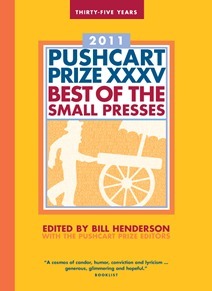 A couple of days ago I mentioned that I was working on a new Pushcart Prize Ranking of Literary Magazines, this one focused on Nonfiction. I posted the first phase of that ranking, which was to list just the winners for a five-year period, 2007-2011.
A couple of days ago I mentioned that I was working on a new Pushcart Prize Ranking of Literary Magazines, this one focused on Nonfiction. I posted the first phase of that ranking, which was to list just the winners for a five-year period, 2007-2011.I have now moved on to phase two. This new list features the winners for a ten-year period, 2002-2011 (plus their Special Mentions from the year they won a prize). I had originally planned to go back just nine years, since next month I'll be rolling off the 2002 data when I add 2012 (I'm keeping a ten-year, rolling list).
This new list is pasted below. The next phase, as previously noted, will be to add in the data from Special Mentions for the ten-year period. This will take a week or so, but that will complete the 2011 list (just in time to work on the 2012 list in November).
2002-2011 NONFICTION Pushcart Prize Ranking (interim; excludes most Special Mentions)
2011 Magazine 2011 Score 1 Georgia Review 66 2 Orion 55 3 Agni 34 4 Threepenny Review 31 5 American Scholar 27 5 Conjunctions 27 7 Gettysburg Review 25 8 Fourth Genre 24 8 Iowa Review 24 10 Sun 23 11 New Letters 20 12 Missouri Review 19 13 Creative Nonfiction 18 14 Tin House 15 15 Ploughshares 12 15 River Teeth 12 15 Shenandoah 12 15 Southern Review 12 19 Ecotone 11 19 Hudson Review 11 19 Image 11 19 Salmagundi 11 23 Paris Review 10 23 Poetry 10 23 Third Coast 10 26 Brain, Child 7 26 Speakeasy © 7 28 Kenyon Review 6 28 Ninth Letter 6 28 Raritan 6 28 Witness 6 32 American Poetry Review 5 32 Antioch Review 5 32 Bellevue Literary Review 5 32 Colorado Review 5 32 Five Points 5 32 Fugue 5 32 In Character © 5 32 Michigan Quarterly Review 5 32 North Dakota Quarterly 5 32 Northwest Review 5 32 Oregon Humanities 5 32 Passages North 5 32 Pleiades 5 32 Republic of Letters 5 32 The Journal 5 32 The Point 5 32 Virginia Quarterly Review 5 32 Zoetrope: All Story 5 32 ZYZZYVA 5 32 Great River Review 5 32 Shearsman 5 32 Palo Alto Review ? 5 32 Yale Italian Poetry 5
Published on October 18, 2011 12:27
The New Yorker: "Sun City" by Caitlin Horrocks
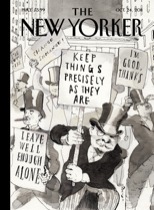
October 24, 2011: "Sun City" by Caitlin Horrocks
I think I liked this story more after I read the briefQ&A with Caitlin Horrocks in which she talks about her own discoveries aboutthe characters while writing the story, and the changes the story went throughin drafts. The story is about Rose who has traveled to Sun City, Arizona afterthe death of her grandmother, Vera. We see Rose and Bev, Vera's "roommate," andmuch of the story is taken up with Rose's interpretation of the relationshipbetween Vera and Bev, which at first seems less than Rose assumed, and then, ina way, more.
And it is Rose who has come, rather than Rose's mother, Vera'sdaughter, because the two were estranged. In any case, Rose and Bev negotiateover the disposition of Vera's stuff—costume jewelry, plates and dishes,furniture, her ashes—and the factthat there isn't more to it is sad, especially because Vera's estrangement withher daughter, and to a lesser extent her disappointment in Rose, is about herwanting them to want more for their own lives. It turns out she didn't wantmuch herself. In a telephone conversation, Rose's mother tells her the one thing of Vera's she might want to have, and I think this story misses an opportunity when Rose realizes that Bev has taken it. Rose's choice of letting Bev keep it is fine, but I wish more had been made of the dilemma.
Alcohol has an interesting role here. Vera, at one point inher life, apparently drank a lot. Bev drinks, but kept it hidden from Vera, soas not to tempt her. Rose is a bartender, and also drinks. In the end, Rosedisplays her talents for Bev by mixing them drinks—an act that Horrocksexplains in the Q&A.
It's a good story, although maybe not a great one.
Published on October 18, 2011 04:56
October 17, 2011
Dreaming: A Tree Falls
[image error]
It's not too hard to figure out where this dream of mine came from. I have a big yard with lots of trees. Sometimes they fall down. It happens. It especially happens along the creek that runs through the yard--no doubt the creak was instrumental in bringing the seed (or nut, in the case of the walnut trees) that turned into the trees along its edge, and it's also the instrument of their demise, as the ground is washed away from under the roots. A couple of years ago, a large walnut tree fell across the creek, making a fascinating bridge (mostly for squirrels). Last winter, another walnut tree tipped in the opposite direction and leaned against a larger walnut. It remained alive, and even shot new limbs from much lower on the trunk than it would have if it had remained upright. Lately, that tree has been slipping lower. It's final collapse is now only a matter of time, and every time I go by--which is every day, since it's on the path the dog and I take on our Noon walks--I wonder when that will happen.
Judging by my dream last night, I'd say soon. In the dream I was using a handy new tool--a laser pruning device--to trim the branches from very high in a tree in the yard. We're talking skyscraper high. I wasn't too skilled at using the pruner, though, and I cut too much. A big chunk of that tree came crashing down, but it fell not in my yard but on a tree in the neighbor's yard, bringing that tree down with it. And then a huge walnut tree in the neighbor's hard also fell, just missing his house.
Apart from thinking that the tree in my yard is doomed, I'm also wondering if I can get a patent on this laser pruner, which seems like a great idea--in the right hands.
Judging by my dream last night, I'd say soon. In the dream I was using a handy new tool--a laser pruning device--to trim the branches from very high in a tree in the yard. We're talking skyscraper high. I wasn't too skilled at using the pruner, though, and I cut too much. A big chunk of that tree came crashing down, but it fell not in my yard but on a tree in the neighbor's yard, bringing that tree down with it. And then a huge walnut tree in the neighbor's hard also fell, just missing his house.
Apart from thinking that the tree in my yard is doomed, I'm also wondering if I can get a patent on this laser pruner, which seems like a great idea--in the right hands.
Published on October 17, 2011 09:50
October 16, 2011
Work in Progress: Pushcart Prize Ranking for NONFICTION
 As promised, I have finally turned my attention to the NONFICTION Pushcart Prizes and will soon be posting a ranking of magazines that have been recognized for their nonfiction. I'll do this in a few stages. First, I'll post a list that ranks solely by Pushcart Prizes won over the last 5 years. Next, I'll push that back to 9 years. I'll then add the data for the Special Mentions won over the same period (or possibly in phases, since that's quite a chore), although this is unlikely to have much impact on the overall rankings at the top of the list. Finally, after the 2012 volume arrives in November I'll add the new data at the same time I update the FICTION list, so that both lists will reflect 10 years of Prizes and Special Mentions.
As promised, I have finally turned my attention to the NONFICTION Pushcart Prizes and will soon be posting a ranking of magazines that have been recognized for their nonfiction. I'll do this in a few stages. First, I'll post a list that ranks solely by Pushcart Prizes won over the last 5 years. Next, I'll push that back to 9 years. I'll then add the data for the Special Mentions won over the same period (or possibly in phases, since that's quite a chore), although this is unlikely to have much impact on the overall rankings at the top of the list. Finally, after the 2012 volume arrives in November I'll add the new data at the same time I update the FICTION list, so that both lists will reflect 10 years of Prizes and Special Mentions.I've also started work on a POETRY list, but I may not get that finished until the winter (think snowbound).
Stay tuned!
Edited, Sunday 10/16/11, 2pm.
The first phase is complete. As noted above, this is a ranking of magazines from 2007-2011 based on the number of Pushcart Prizes won for Nonfiction, plus the Special Mentions earned by magazines that also won Prizes. It does NOT include any magazines that only earned Special Mentions. In the coming weeks, this list will be expanded to include Prizes won from 2003-2006 as well as all Special Mentions during the period 2003-2011. It will be updated in November to include the 2012 list when the new Pushcart Prize volume arrives.
NONFICTION Pushcart Prize Ranking, 2007-2011
2011 Magazine 2011 Score 1 Orion 40 2 Georgia Review 29 3 Sun 23 4 Conjunctions 22 5 Agni 20 6 Missouri Review 19 7 New Letters 15 8 American Scholar 13 9 Iowa Review 12 9 Ploughshares 12 9 Shenandoah 12 12 Ecotone 11 12 Gettysburg Review 11 14 Third Coast 10 15 Southern Review 7 15 River Teeth 7 15 Fourth Genre 7 18 Image 6 18 Kenyon Review 6 18 Ninth Letter 6 18 Threepenny Review 6 22 Colorado Review 5 22 Five Points 5 22 Paris Review 5 22 Passages North 5 22 Pleiades 5 22 Salmagundi 5 22 The Journal 5 22 Tin House 5 22 Virginia Quarterly Review 5 22 The Point 5 22 American Poetry Review 5 22 In Character © 5 22 North Dakota Quarterly 5 22 Republic of Letters 5 22 Poetry 5 22 Oregon Humanities 5
Published on October 16, 2011 08:10
October 15, 2011
Tips for Writers: The Comma
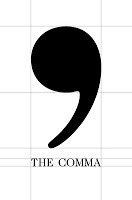 There aren't a lot of rules in writing fiction, but here'sone that's too often ignored: punctuation matters. It is somewhat shocking tome to see poorly punctuated work by writers who are seeking publication inprofessional journals. Grammar mistakes are one thing; in fiction, many writerstake liberties with grammar. But creative punctuation? I don't think so.
There aren't a lot of rules in writing fiction, but here'sone that's too often ignored: punctuation matters. It is somewhat shocking tome to see poorly punctuated work by writers who are seeking publication inprofessional journals. Grammar mistakes are one thing; in fiction, many writerstake liberties with grammar. But creative punctuation? I don't think so.Periods and question marks are pretty easy, although somewriters aren't sure what to do with them if there's a quotation mark in themix. Most writers stay away from exclamation points, either because they aren'tvery emphatic to begin with or they've heard the maxim that writers arepermitted only three exclamation points in a career and they don't want to usetheirs too soon. Semi-colons are harder, but lots of writers avoid them becausethey either don't like them or know that they don't know how to use them. Fairenough.
The real problem is the comma. I confess that I wasn'tconfident in my comma usage until I started teaching Freshman Composition in acommunity college. I realized that in order to teach kids whose grasp ofgrammar and punctuation was weak, I was going to need to learn it myself. Andwith the help of Diana Hacker's AWriter's Reference, a book I still refer to occasionally, I did just that.
Now, contrary to what I said above, in fiction, especially, one can be somewhatcreative with commas. Although there are rules, and a misplaced comma will drawan editor's attention (not necessarily a good thing), sometimes a writer wantsto slow the reader down or to otherwise alter the rhythm of a sentence. A commais good for that, although a wise writer would be sparing with such usages. But in order to break the comma rules for effect, you first have to know what the rules are.
Here's the tip: find a grammar guide and learn how to usecommas. Your editors will thank you.
Published on October 15, 2011 04:46
October 14, 2011
$5 Submission? I don't think so.
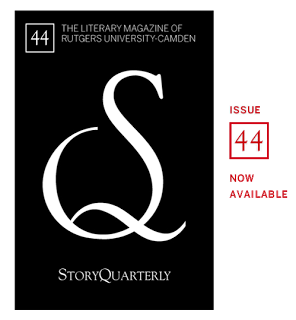 I just learned that StoryQuarterly, the magazine that used to be independent, was swallowed by Narrative, and then re-emerged as the Literary Magazine of Rutgers-Camden, is now charging $5 for each submission. I'm not going to pay it.
I just learned that StoryQuarterly, the magazine that used to be independent, was swallowed by Narrative, and then re-emerged as the Literary Magazine of Rutgers-Camden, is now charging $5 for each submission. I'm not going to pay it.More and more magazines are charging a little something for electronic submissions, $2 or less, sometimes $3. While many object to those fees--the electronic submission doesn't have to increase a magazine's costs, so why do they charge anything?--at least those fees are pretty close to what it would cost to copy and mail a story with a self-addressed stamped envelope.
But $5? I don't think so. If they want to turn off the spigot of submissions so that they can focus solely on soliciting work, they've made an excellent move. I don't suppose they'll miss getting work from me--I usually send one story a year and recently withdrew a story that had been accepted elsewhere--but I'm just not going to pay them $5 to submit.
Published on October 14, 2011 04:37
October 12, 2011
2011 National Book Award Finalists
Fiction
Andrew Krivak, The SojournBellevue Literary Press
Téa Obreht, The Tiger's Wife(Random House)
Julie Otsuka, The Buddha in the Attic(Alfred A. Knopf, an imprint of Random House)
Edith Pearlman, Binocular Vision(Lookout Books, an imprint of the Department of Creative Writing at the University of North Carolina Wilmington)
Jesmyn Ward, Salvage the Bones(Bloomsbury USA)
Nonfiction
Deborah Baker, The Convert: A Tale of Exile and Extremism(Graywolf Press)
Mary Gabriel, Love and Capital: Karl and Jenny Marx and the Birth of a Revolution(Little, Brown and Company)
Stephen Greenblatt, The Swerve: How the World Became Modern(W. W. Norton & Company)
Manning Marable, Malcolm X: A Life of Reinvention(Viking Press, an imprint of Penguin Group USA)
Lauren Redniss, Radioactive: Marie & Pierre Curie, A Tale of Love and Fallout(It Books, an imprint of HarperCollinsPublishers)
Poetry
Nikky Finney, Head Off & Split (TriQuarterly, an imprint of Northwestern University Press)
Yusef Komunyakaa, The Chameleon Couch(Farrar, Straus and Giroux)
Carl Phillips, Double Shadow(Farrar, Straus and Giroux)
Adrienne Rich, Tonight No Poetry Will Serve: Poems 2007-2010(W.W. Norton & Company)
Bruce Smith, Devotions(University of Chicago Press)
Young People's Literature
Franny Billingsley, Chime(Dial Books, an imprint of Penguin Group USA, Inc.)
Debby Dahl Edwardson, My Name Is Not Easy(Marshall Cavendish) Thanhha Lai, Inside Out and Back Again(Harper, an imprint of HarperCollinsPublishers) Albert Marrin, Flesh and Blood So Cheap: The Triangle Fire and Its Legacy(Alfred A. Knopf, an imprint of Random House Children's Books) Lauren Myracle, Shine(Amulet Books, an imprint of ABRAMS) Gary D. Schmidt, Okay for Now(Clarion Books, an imprint of Houghton Mifflin Harcourt)
Published on October 12, 2011 13:09
October 11, 2011
The New Yorker: "Exorcism" by Eugene O'Neill
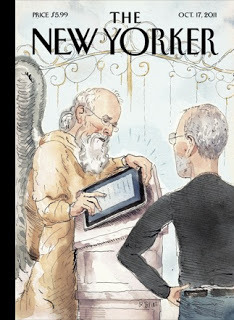
October 17, 2011: "Exorcism" by Eugene O'Neill
Eugene O'Neill is spinning in his grave, although it's funfor us to have this "new" O'Neill play to study. "Exorcism" is a one-act playthat was performed in a short run in 1920, after which O'Neill had all thecopies destroyed. Except they weren't, of course, and one recently turned up.It's being published later this year and you can read it now in The New Yorker(if you have a subscription). (And if you don't have a subscription, you canstill go to the website and check out the video of an actor reading part of theplay.)
To the extent there is suspense here, it's mostly lost whenthe introduction tells us that the play is autobiographical and deals with O'Neill'searly suicide attempt. So when Ned Malloy drops broad hints ("Later? Supposingthere wasn't any—"), there's not much doubt about what he means, although hispal Jimmy doesn't seem to get it. Except he does, apparently, as he revealslater: "You'd been dropping hints—dark, dark hints—you weren't yourself, youknow—and I had my suspicions…"
The play isn't about an exorcism so much as it is aboutresurrection. Ned attempts suicide, his friends save him, and now his eyes areopen to the possibilities of spring, both literal and metaphorical. There'sbeen a reconciliation of sorts with his father, cessation of hostilities withhis estranged wife, and the doom and gloom (again, both literal andmetaphorical) have lifted.
It's a quick read and I recommend it if you have access toit. But it's not exactly O'Neill's greatest work, and I don't think I can blamehim for wanting all traces of it destroyed.
Published on October 11, 2011 06:41
October 10, 2011
Wine & Words, Words & Wine
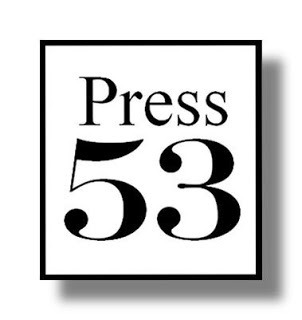 Wine and words go well together, no matter which order they come in. But in a couple of weeks I'm going to experience them coming and going.
Wine and words go well together, no matter which order they come in. But in a couple of weeks I'm going to experience them coming and going.On Saturday the 22nd I'll be heading down to Winston-Salem for Press 53's annual Wine & Words Fest. This is the annual celebration at which they give out the trophies for the Open Awards, and generally celebrate the activities of the Press. Since Press 53 published my first book, is publishing my second next year, and is the publisher of the magazine I edit, I'm delighted to celebrate with them!
 And then the next day I'll be heading directly to Charlottesville, VA, or rather to a little town east of there, to Keswick Vineyards for Words & Wine, the annual fundraiser for Writer House, the terrific organization in Charlottesville that provides such great services to the local writing community. I've attended events there, been on panels, given readings, taught a seminar . . .
And then the next day I'll be heading directly to Charlottesville, VA, or rather to a little town east of there, to Keswick Vineyards for Words & Wine, the annual fundraiser for Writer House, the terrific organization in Charlottesville that provides such great services to the local writing community. I've attended events there, been on panels, given readings, taught a seminar . . .Good people, and I'm looking forward to the event.
Words & Wine, Wine & Words. Not necessarily in that order.
Published on October 10, 2011 15:02



